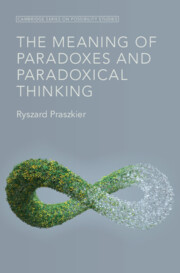Book contents
- The Meaning of Paradoxes and Paradoxical Thinking
- Cambridge series on possibility studies
- The Meaning of Paradoxes and Paradoxical Thinking
- Copyright page
- Contents
- Figures
- Tables
- Acknowledgments
- Introduction
- Part 1 Paradoxes and What They Do to Us
- Part II Sudden Unexpected Changes
- Part III Challenging the Impossible
- Part IV Peace and Its Challenges
- Introduction
- Chapter 10 Peace-Oriented Mindset (POM)
- Chapter 11 POM Heroes
- Discussion and Summary
- Part V Paradoxes and Creativity
- Part VI Paradoxes in Action
- References
- Index
Chapter 11 - POM Heroes
from Part IV - Peace and Its Challenges
Published online by Cambridge University Press: 04 April 2025
- The Meaning of Paradoxes and Paradoxical Thinking
- Cambridge series on possibility studies
- The Meaning of Paradoxes and Paradoxical Thinking
- Copyright page
- Contents
- Figures
- Tables
- Acknowledgments
- Introduction
- Part 1 Paradoxes and What They Do to Us
- Part II Sudden Unexpected Changes
- Part III Challenging the Impossible
- Part IV Peace and Its Challenges
- Introduction
- Chapter 10 Peace-Oriented Mindset (POM)
- Chapter 11 POM Heroes
- Discussion and Summary
- Part V Paradoxes and Creativity
- Part VI Paradoxes in Action
- References
- Index
Summary
The chapter presents diverse examples of peacebuilding projects that circumvent conflict through bottom-up civic initiatives, thereby empowering peace-oriented dynamics. Fatuma Adan was born to parents from two warring tribes in northern Kenya. She pursued a legal education, and after completing her training she returned to her hometown to promote peace between the conflicting Borana Oromo, Gabra, and Rendille peoples. She launched the Traditional Elders for Peace program, involving and empowering elders to resolve conflicts peacefully. Hahrie Han (USA), the daughter of Korean immigrants, launched the Agora Institute, based on the ancient forum in which Athenians learned both the rights and responsibilities of democracy, whereby they developed a capacity for participation in public life. Krzysztof Czyżewski from Polish the border, coined the term “xenopolis” (meaning a meeting point for aliens), similar to Han’s agora. He demonstrated that attempting to overcome deeply ingrained crossborder and crossreligious prejudices can be far more effective when addressed through a variety of small, community-based initiatives rather than confronting and tackling the issues head-on. The Borderline Foundation encourages children to publish a local chronicle, publicizing youth efforts in searching for, collecting, and exhibiting old postcards and photos, as well as tracing the multiethnic history of the area
Keywords
- Type
- Chapter
- Information
- The Meaning of Paradoxes and Paradoxical Thinking , pp. 88 - 91Publisher: Cambridge University PressPrint publication year: 2025

